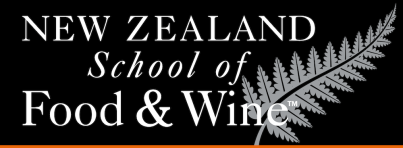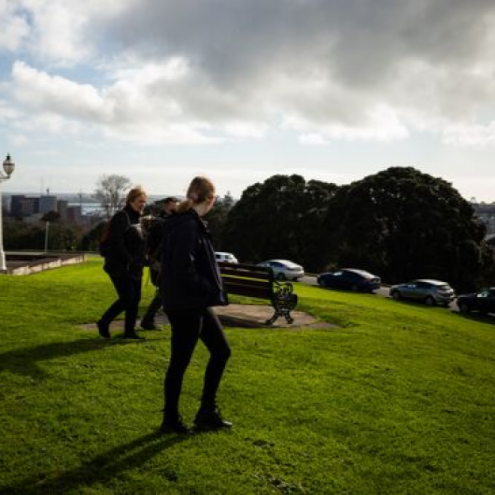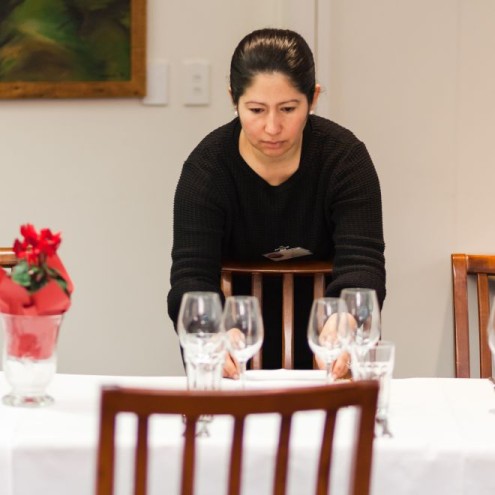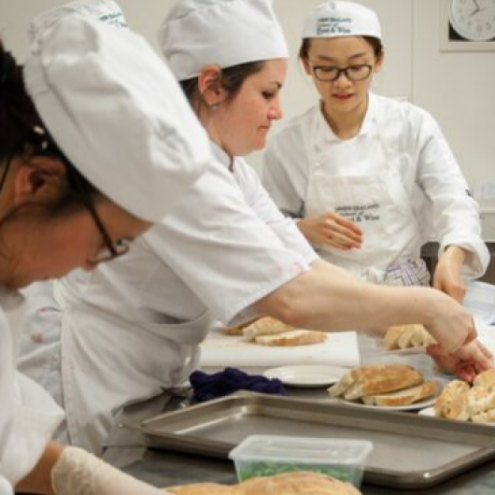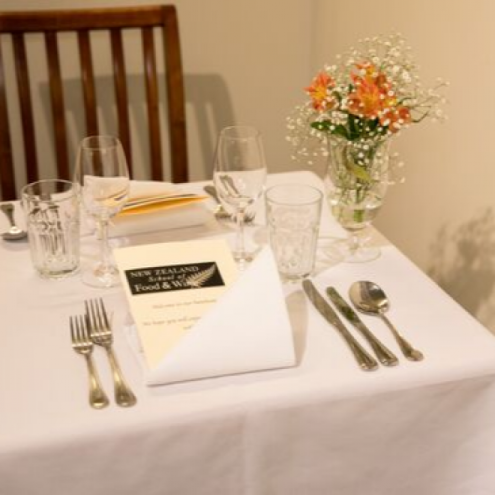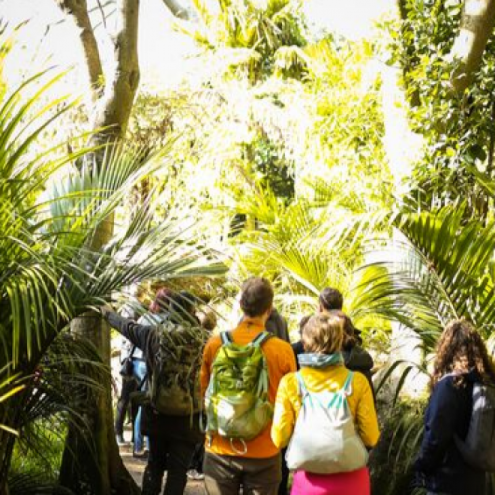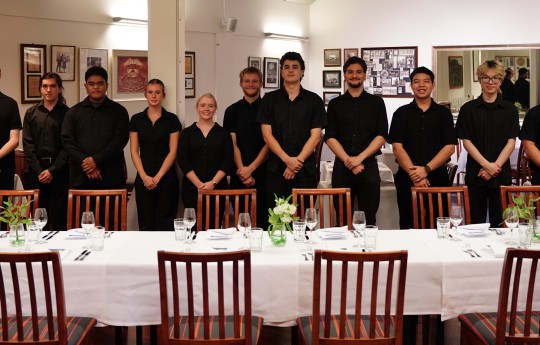Living & Studying in New Zealand
KIA ORA, WELCOME TO NEW ZEALAND!
Before you arrive you'll want to learn as much as you can about New Zealand. For information about New Zealand, visit the official Tourism New Zealand website.
View information about studying in New Zealand from the New Zealand Government and Education New Zealand.
View the International Student page from Auckland City Council.
Click here to download a helpful map and poster of Auckland's main attractions.
Use this helpful tool to plan your study in New Zealand.
TRAVEL DOCUMENT CHECKLIST
Make sure to bring with you your:
- Complete the New Zealand Traveller decloration form here.
- Passport (valid for 3 months aftre your visa ends.)
- Valid Medical Insurance policy
- Offer of Place from NZSFW
- Visa
- Driver's license (optional) - an international or own-country driving license is valid for one year in New Zealand. After that you will need to obtain a New Zealand drivers license.
- NZ$1000 cash until you have your bank account set up
IMMIGRATION AND CUSTOMS
On arrival in New Zealand you will have to go through New Zealand Customs. You will have been given a form to complete on the plane which outlines prohibited goods. Read the form carefully. Be especially aware that you must declare food of any kind. A forgotten apple in the bottom of your bag will earn you an instant fine of NZ$400 - not a good way to start your Kiwi experience.
Most medication is available in New Zealand, but check with your doctor first. If you are carrying prescription medicines or controlled drugs you should:
- Have a prescription from your physician advising that the medicine is being used under a doctor's direction and is necessary for your physical well-being.
- Carry the drugs in their original containers.
- Have sufficient quantity not exceeding three months supply for prescription medicines or one month supply for controlled drugs.
TRANSPORT FROM THE AIRPORT
You should fly into Auckland International Airport. To get into the city you can go by:
- Taxi: costs about NZ$70-$90 and takes 30 or 40 minutes. There are Airport bus and train options also available from the airport to popular suburbs in Auckland.
- Uber costs approx NZ$70-$80 and takes 30 or 40 minutes (varies during peak hours & during promotions)
You can ask for help from the friendly people at the I-SITE Visitors Centre at the airport.
WHAT CLOTHES SHOULD I PACK?
Auckland is warm and humid in the summer, in the winter it gets cold and it can rain all year. Make sure you pack warm clothing along with summer clothes. You can bring your favorite jeans, t-shirts, jerseys (sweaters), sweatshirts, shoes and sports shoes. Bring formal clothing for special occasions. You'll also need a warm waterproof jacket.
ELECTRICAL GOODS
If you are bringing in electrical goods, such as computers, hairdryers etc., be aware that electricity throughout New Zealand is supplied at 230 volts, 50 hertz. Most power sockets accept three-pin plugs or similar adaptors. You can buy adaptors readily in New Zealand. Most student rooms will be wired for internet use, but check with your specific accommodation.
ABOUT AUCKLAND
Depending on where you come from you may find Auckland very small and quiet or a huge bustling city! Make sure you discover the variety of attractions Auckland has to offer. Auckland is a vibrant multicultural city beside the sea, sprawled between two harbours and two oceans - the Tasman and the Pacific. It offers the best of both worlds - all the buzz, entertainment, nightlife and cultural activities of a big city, as well as an outdoor lifestyle with numerous sporting and leisure activities.
Our city has an excellent reputation around the world as a study destination. Not only is the quality of education very high, there is a wide range of activities on offer, the city is considered very safe, and the locals friendly and welcoming. Study in Auckland.
Explore the beautiful beaches, take a ferry to one of the offshore sub-tropical islands, and visit the Auckland Museum. Make sure you attend one of the many local and international festivals, exhibitions and performances held frequently in Auckland.
Check out the official Auckland website.
Get regular updates for what's on in Auckland.
KIWIS - THE PEOPLE
There is a definite Kiwi culture and if you're not expecting any cultural differences you may be in for a shock! Kiwis are generally considered to be relaxed, friendly and outgoing. Although this is a huge generalisation, we like to think there is some truth to it. Informality is the norm in most social settings. Kiwis have a distinctive sense of humour which may come across as sarcastic, but don't take offence, they expect the same back.
Sport plays a large part in the Kiwi lifestyle so if you want to meet Kiwis, a sports team is a great place to start. While the legal drinking age is 18, emphasis is placed on responsible drinking. Drink driving laws are strictly enforced.
Māori are the indigenous people of New Zealand-Aotearoa.
Te Reo (the Māori language) is an official language of the country, along with English and New Zealand Sign Language.
While the best way to learn about Māori culture is to experience it first hand, Te Ara - The Encyclopedia of New Zealand - has some excellent reading. It covers the history of Māori arrival and settlement and an overview of Māori culture to the present day.
Learn more about the Māori culture.
WEATHER
- Summer: December - February; Average Auckland 24 degrees C, 75 degrees F to 15 degrees C, 59 degrees F
- Autumn (fall): March - May; Average Auckland 23 degrees C, 73 degrees F - 10 degrees C, 50 degrees F
- Winter: June - August; Average Auckland 15 degrees C, 59 degrees F - 7 degrees C, 44 degrees F
- Spring: September - November; Average Auckland 20 degrees C, 68 degrees F - 11 degrees C, 51 degrees F
TRANSPORT
If you are living in or close to the central city, you are able to explore the city on foot.
Alternatively, there are a range of public transport options. Students completing full-time study with NZSFW will be able to purchase subsidised public transport with their Student ID.
You can travel by Bus, Train & Ferry depending on where your accommodation is. To start you can use any major credit/debit card to pay for Bus, Train ect. Once you are a regular user, we recommend purchasing a HOP Card which allows for student discounts. To plan your journey around the city you will have to download the AT Transport app on your Android / iOS device.
For Auckland Transport information and journey planner visit here.
COST OF LIVING
Living costs vary from student to student. Here are expected minimum annual (1 year) living costs you should budget for. You should also complete research into your own expected costs. This table shows the NZ$ cost of some commonly purchased items.
This information is a guide only.
Find out more about Living in Auckland.
DESCRIPTION |
ESTIMATED NON - DISCOUNTED NZ$ |
| Large Pizza | $20.00 - $30.00 |
| Asian Meal | $17.00 - $25.00 |
| Sandwich | $10.00 |
| Espresso | $6.00 |
| Can of Aerated Drink | $5 - $7 |
| Beer (pint) in a bar | $15 - $20 |
| Wine (750 ml) | $15 - $25 |
| Movie Ticket | $27 |
| Cellphone Contract (300 Free NZ Mins) | $35.00 / 4 weeks |
Updated December 2024
MONEY MATTERS
Money is always one of the first things you need. Bring enough cash with you to get you through the first few days. NZ$1000 should be enough. It's easy to change your money (traveller's cheques or cash) at a bank, or Bureau de Change kiosk at the airport, in the city or in your suburb.
The New Zealand dollar is the currency used in New Zealand. 100 cents = one dollar ($1). To check current conversion rates with your home currency check out www.XE.com.
OPENING A BANK ACCOUNT
It is a good idea to open a New Zealand bank account. Nearly all the major banks have international student packages. You should take your passport, proof of your enrolment in a New Zealand education provider, permanent tax number proof from your home country and proof of address in NZ.
ATMs - Automatic Teller Machines are widely used in New Zealand and readily accessible.
Few popular banks around the city - ASB Bank, ANZ Bank, Westpac etc.
SHOPPING
Shop opening hours vary. Standard hours are from 9:00 am to 5.30 pm on weekdays. Many shops, especially those in shopping malls, also open at the weekends, though hours may be different. Supermarkets have extended hours seven days a week. If you want cheap but reasonable quality goods such as linen and small household appliances, The Warehouse or K Mart chain of stores are popular.
Other supermarkets for grocery shopping are Pak n Save, Woolworths & New World
Queen Street and Newmarket are one of the major shopping hubs in Auckland City that hosts all the popular New Zealand & International brands. Other malls to look out for are Westfield (located in multiple locations), Sylvia Park and the outlet mall Dress Smart in Onehunga.
MEDICAL HELP
If you need urgent medical attention in the first few days, ask the staff at your accommodation to tell you where the nearest accident and medical centre is located.
KEEPING SAFE
These centres are located around the city and are usually open 7 days a week for extended hours. Follow this link information about Accident and Emergency clinics in Auckland.
In serious emergencies requiring an ambulance or Police, call 111.
NZSFW’s goal is to ensure international students are as well supported in order to have a safe, happy, healthy and successful time living and studying in New Zealand.
OTHER HELPFUL LINKS
Citizens Advice Bureau: offer useful services and advice
Victim support: If something bad has happened
FAQ's
updated 13/10/24
